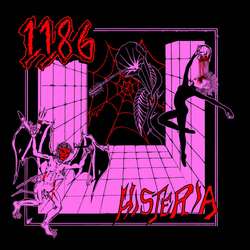As I’ve gotten older, there are punk scenes I shy away from. Among those topping the list is street punk—not to totally write off the subgenre, but a lot of it gets bogged down in sloppy slogans, ridiculous themes, and a rather rigid dress code. It’s not that I’ve grown averse to a well-written street punk song as much as it’s sometimes style-over-substance image doesn’t rub me the right way. Well, there are bands out there who are still true to a good singalong, riff happy, raise-your-fist-isms without making sure they stud their leather jacket and put up their ‘hawk first.
The Magnificent are a three-piece from England. From the album cover’s simple brick wall line-up shot of the band in casual wear, they proclaim a direct approach. From the opening riffs of “1981,” it’s loud, short, and to-the-point, and it’s easy to picture Jimmy Islip up front, legs spread in a wide, Joey Ramone-stance, as he pounds his bass and shouts out the words. While the record carries a strong undertow of street punk, coming first-and-foremost in the verse-chorus-verse structures and chant-like refrains, there are also thematic elements as the songs tend to cover topics such as the working class, booze, and a love of music. There’s even a touch of civic pride thrown in there in “Buy More Crap.” The most guilty of these characteristics are the aptly titled “Working Men’s Club (Part 3)” and closer “King of Denim Jackets,” which has a distinct (older) Dropkick Murphys or Rancid feel to it. In fact, a lot of songs bear similarity to Rancid side project Lars Frederiksen & the Bastards if you entirely swapped out the hooliganism and injected a peppy dose of optimism.
The Magnificent clearly take a firm influence from street punk, but the way they carry themselves from stage presence to inflection comes more from a pop-punk world inspired by the likes of Screeching Weasel and its many offshoots. It’s clean production with fast and short songs. The whole 10 song record flies past quick enough for the LP to spin at 45rpm. The aforementioned “King of Denim Jackets” closes out with a round of “whoa-oh-ohs” that really drives this point home, seamlessly blending different punk influences and giving both a classic and modern feel at the same time. It straddles different styles, but it maintains that everyman ethic without getting bogged down by genre convention.
Bad Lucky isn’t perfect. Islip, while a strong vocalist, tends to stick to the same key throughout and, even with the record being so short, it can drone a little bit. The band tries to mix it up with backing vocals, primarily from guitarist Matt Colmer, but it’s only so effective. Either a vocal trade-off now and then, or perhaps a little more tonal variety would help the flow and, midway through, it loses a bit of the spark that dominates the opening “1981.” It’s definitely a solid pick-up and a band with the potential to grow.




